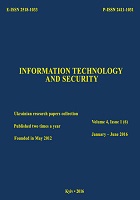Use of special software for analysis of the information aggression of the Russian Federation against Ukraine
DOI:
https://doi.org/10.20535/2411-1031.2017.5.1.120552Keywords:
Information aggression, propaganda, misinformation, special programmatic tool, information influence, information flows, content monitoring, aggression of the Russian Federation.Abstract
In the framework of the hybrid war that is taking place in the territory of our state, the Russian Federation is widely using misinformation and propaganda to conceal the truthful information about the course of hostilities, misleading our compatriots and the international community. In turn, the use of information weapons creates favorable conditions for the intensification of the conflict in the west of our country, allows the leadership of the Russian Federation to deny the presence of its armed forces on the territory of Ukraine, provides a diplomatic coverage of military measures and the conduct of international policy of the Russian Federation. This confirms the existence of a real threat to Ukraine’s information space. In order to counter such threats and related information influences, existing methods of intellectual linguistic analysis of the text are used. Usage of these methods allows us to make a detailed research of information aggression against Ukraine for more effective counteraction and development of own means of defense for ensuring the national security of the state. Since the main space for disseminating of information is the Internet, the article describes the use of the developed software for monitoring the global network of the information aggression of the Russian Federation against Ukraine. Consequently, the purpose of this work is to analyze the information aggression of the Russian Federation in the global Internet with the help of a special software “Support Ukraine”. Existing tools for intelligent data processing and information confrontation are analyzed in order to achieve this purpose. The results of the analysis confirm the necessity of creating and using the indicated means. Its advantages are the convenience of using and the ability to create your own vocabulary. Due to this possibility, its capabilities are expanding.
References
“Methods and Stages of Data Mining”. [Online]. Available: http://www.intuit.ru/. Accessed on: March 12, 2017.
“USSR. On the guard of the victories of October”. [Online]. Available: https://www.e-reading.club/chapter.php/1025953/3/Degtyarev-Enciklopediya_specsluzhb.html. Accessed on: March 12, 2017.
“Five stages of digital transformation”. [Online]. Available: http://www.computerworld.ru Accessed on: March 12, 2017.
“DataMining”. [Online]. Available at: https://www.coursehero.com. Accessed on: March 12, 2017.
“Advanced Search Google”. [Online]. Available: https://support.google.com/websearch/ answer/35890?hl=en. Accessed on: March 13, 2017.
V. Furashev, and D. Lande, ”Information Operations through the Prism of Monitoring and Integrating Internet Resources”, Legal Informatics, no. 2 (22), pp. 49-57, 2009.
D. Lande, V. Furashev, S. Braichevskyi, and O. Hryhoriev, Fundamentals of Modeling and Evaluation of Electronic Information Flows. Kiev, Ukraine: Engineering, 2006.
“Information flows in the organization”. [Online]. Available: https://studfiles.net/preview/ 5043453/page:3/. Accessed on: March 13, 2017.
V. Panchenko, ”Information Operations in Russia’s Asymmetric War Against Ukraine: Approaches to Modeling”, Information and Law, no. 3 (12), pp. 13-16, 2014.
“Is it convenient to search in Google”. [Online]. Available: http://ktonanovenkogo.ru/seo/ search/iskat-v-gugle-guglit-filtry-rasshirennye-poisk-operatory-google-prikoly.html. Accessed on: March 13, 2017.
The Verkhovna Rada of Ukraine. 6th Session. (June 01, 2010), Law No. 2297-VI, “On protection of personal data”. [Online]. Available: http://zakon2.rada.gov.ua/laws/ show/2297-17. Accessed on: March 13, 2017.
“Separator”. [Online]. Available: https://wikipedia.org. Accessed: March 13, 2017.
Y. Zharkov, L. Kompantseva, V. Ostroukhov, V. Petryk, M. Prysyazhnyuk, and E. Skulish, History of information-psychological confrontation. Kyiv, Ukraine: Science Department at the Security Service of Ukraine, 2012.
Downloads
Published
How to Cite
Issue
Section
License
Copyright (c) 2020 Collection "Information technology and security"

This work is licensed under a Creative Commons Attribution 4.0 International License.
The authors that are published in this collection, agree to the following terms:
- The authors reserve the right to authorship of their work and pass the collection right of first publication this work is licensed under the Creative Commons Attribution License, which allows others to freely distribute the published work with the obligatory reference to the authors of the original work and the first publication of the work in this collection.
- The authors have the right to conclude an agreement on exclusive distribution of the work in the form in which it was published this anthology (for example, to place the work in a digital repository institution or to publish in the structure of the monograph), provided that references to the first publication of the work in this collection.
- Policy of the journal allows and encourages the placement of authors on the Internet (for example, in storage facilities or on personal web sites) the manuscript of the work, prior to the submission of the manuscript to the editor, and during its editorial processing, as it contributes to productive scientific discussion and positive effect on the efficiency and dynamics of citations of published work (see The Effect of Open Access).

